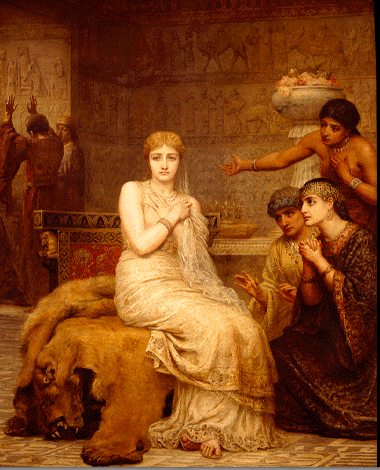“For a full 180 days he displayed the vast wealth of his kingdom and the splendor and glory of his majesty. When these days were over, the king gave a banquet, lasting seven days, in the enclosed garden of the king’s palace, for all the people from the least to the greatest who were in the citadel of Susa.” Esther 1:4-5
Chapter 1
Read Esther 1:1-22 at Bible Gateway online or in your preferred Bible.
See more: map of the Persian Empire with the capital of Susa shown
The Palace at Susa

The events in the book of Esther take place in the capital of Susa; this was the capital established during the reign of Xerxes’ father, Darius I. There were other capitals in Babylon, Pasargadae, Persepolis, and Ecbatana (Ezra 6:2), but Susa was the favorite. In addition to a sprawling palace complex, it is also the location of the tomb of the prophet Daniel (one of several, actually). Even Nehemiah served at Susa (Nehemiah 1:1).
The palace contains an inscription in the King’s Hall, where the king received his guests, listing all the nations that contributed to the building effort: cedars from Lebanon, silver from Egypt, ivory from India, craftsmen from all parts of the empire, and much more.
“This text [is] interesting because it mentions many nations. The palace was clearly meant as propaganda, where every visitor would be impressed by the size of the empire” (Iran Chamber).
Chapter one opens with a lavish party at the palace in Susa, the first party of 10 in the small book of only 10 chapters. Xerxes wasn’t throwing any old party for the same old guests; he had an ulterior motive for these specific guests. Xerxes needed benefactors to support his military campaign to add Greece to his already vast empire.
Who was Queen Vashti?
Vashti is said to be the great-granddaughter of King Nebuchadnezzar II of Babylon–the orphaned daughter of Belshazzar (Midrash). Her father was slain when the Medes came and overthrew his kingdom (Daniel 5:1-31). She was exceptionally beautiful, and given her family line, I believe she was equally as intelligent (Esther 1:11). There are several conflicting views of Vashti’s character in the midrashes. She may also have been politically savvy: a popular view is that the real reason she held a women’s banquet was in the case of a coup on Xerxes’ throne–she would use the women as hostages. All this would have made her an exquisite display of his kingdom.
On the last day of the banquet Xerxes calls for Queen Vashti to come before him, presumably to “inspire patriotism” among his guests (Archaeological Study Bible p.716). To the utter embarrassment of Xerxes, the Queen refused the request. We are not told why she refused, but there are several theories as to why. One reason may be that she knew they were drunk and didn’t want to subject herself to humiliation, danger, or lose her dignity. Another theory is that the request for her to be “wearing her royal crown” meant that she was to wear only the crown. Another theory as to why she refused is because she felt she was the rightful heir to the throne. Regardless of the reason, she refused and caused a scene befitting a soap opera.
Persian Lawmaking

“Therefore, if it pleases the king, let him issue a royal decree and let it be written in the laws of Persia and Media, which cannot be repealed” (Esther 1:19)
Notice that the text mentions that the law cannot be repealed, as was Persian custom. This is also mentioned in Daniel 6:12, when a Babylonian law is made to entrap the prophet Daniel. The same laws are being used to banish Vashti, and will come into play again at the climax of the Esther story in Esther 8:8.
The decree is sent it out via the Royal Road to all parts of the Empire.
The Greek historian Herodotus notes that the Persians had a custom of heavy drinking. They would make a decision only after discussing it while both drunk and sober (Her.Hist.1.33). Xerxes was making plans to go to war, and this was the last day he had to convince his guests to support his war effort.
Learn more:
- Watch: Persepolis Recreated to see what the ancient palace of Persepolis would have looked like to Esther
- Read: Xerxes’ failed conquest of Greece according to Herodotus (Book VII). The Battle of Thermopylae is also depicted in the popular film 300.
- Know a policy wonk? Read more about the Persian legal system
Keep reading:
<< (Previous) Overview of Esther
>> What took Xerxes so long?
